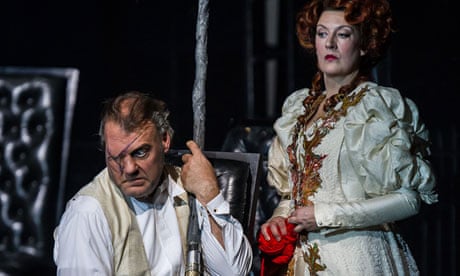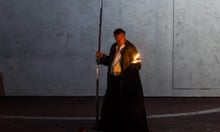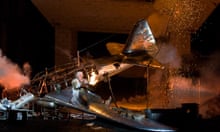It has been said too often that a complete staging of Wagner's Der Ring des Nibelungen is the hardest thing an opera company can undertake, but it's true – and how. The Royal Opera has just begun its revival of Keith Warner's production, a sprawling, Ibsenesque staging from the heady days before the recession, which first came together in its entirety in 2007. The severe black marble sets designed by the late Stefanos Lazaridis will take over the main stage until November, and the whole enterprise will make or break the reputation and morale of the company for the next few years – that's what a Ring cycle does, even in revival.
Everything in The Ring begins with the orchestra, in every sense – and the first night of Das Rheingold, the first opera of the four, suggests the Royal Opera's musical standing is firmer than ever. The opening E flat major chord, gradually building through the orchestra from a spine-tingling double bass note upwards, is mesmerising, all the cruelly exposed brass lines spot on. Under Antonio Pappano's direction, the continuous 160-minute score pushes irresistibly onwards, evolving all the time.
Many singers are new to the production, and none makes more of an impression than Sarah Connolly, who brings to Fricka a vocal richness and intensity of presence that hints at an unusually gripping power struggle to come between her and Wotan. In that role Bryn Terfel is giving what will be his first complete UK performance, and his Rheingold Wotan is, quite rightly, a timebomb set to explode in Die Walküre. Stig Andersen, a veteran of the more heroic Wagner roles, is a vivid Loge; Wolfgang Koch's Alberich is incisive if slightly lightweight-sounding, and Eric Halfvarson and Iain Paterson are an outstanding pair of giants. If Maria Radner's Erda so far lacks some gravitas, her relatively youthful glamour is perhaps not inappropriate given that Wotan dashes off at the end of the opera to father nine Valkyries with her.
Productions of The Ring are often not much loved by audiences when they are new, and Warner's symbol-heavy staging, with the gods as 19th-century industrialists on high and Nibelheim as a horrific factory beneath, didn't buck the trend. Warner has now weeded out some of the clutter, but he still can't resist piling on the information. As the prelude leads into the opening scene and the naked Rhinemaidens scurry out, there are still some moments that will ensure all but the most erudite experts in Nordic mythology will start the cycle in a state of bafflement. There is always an unresolvable tension between narrative and symbolism in Wagner, but so far this production remains hobbled by it.




Comments (…)
Sign in or create your Guardian account to join the discussion